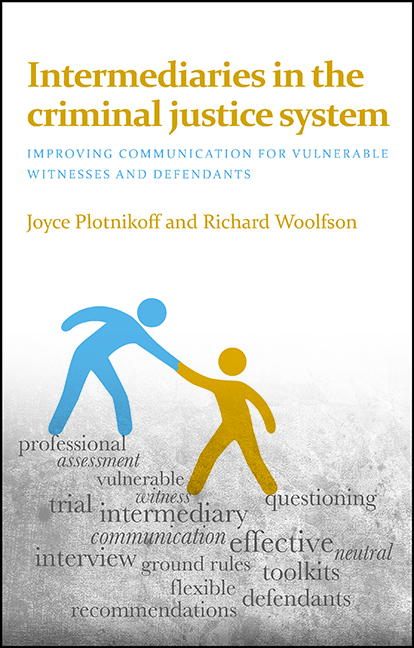 Intermediaries in the Criminal Justice System
Intermediaries in the Criminal Justice System Book contents
- Frontmatter
- Contents
- About the authors
- The Nuffield Foundation
- Acknowledgements
- Foreword
- one Introduction: a fresh pair of eyes
- two The intermediary scheme in England and Wales
- three Behind the scenes: planning to assess the witness
- four Assessment methods and involvement of the interviewer
- five Communication aids and stress reduction strategies
- six Contributing to the effectiveness of the police interview
- seven Negotiating professional space at the ground rules hearing
- eight Making the ground rules hearing effective
- nine ‘Every reasonable step’: preparation for giving evidence
- ten Cross-examination: research, case law, training and regulation
- eleven Cross-examination: intervention at trial
- twelve Cross-examination: challenges at the cutting edge
- thirteen The uneasy position of vulnerable defendants
- fourteen A new profession
- fifteen Conclusion
- References
- Index
- Table of cases
- Legislation
- Rules
- Practice directions
eleven - Cross-examination: intervention at trial
Published online by Cambridge University Press: 08 March 2022
- Frontmatter
- Contents
- About the authors
- The Nuffield Foundation
- Acknowledgements
- Foreword
- one Introduction: a fresh pair of eyes
- two The intermediary scheme in England and Wales
- three Behind the scenes: planning to assess the witness
- four Assessment methods and involvement of the interviewer
- five Communication aids and stress reduction strategies
- six Contributing to the effectiveness of the police interview
- seven Negotiating professional space at the ground rules hearing
- eight Making the ground rules hearing effective
- nine ‘Every reasonable step’: preparation for giving evidence
- ten Cross-examination: research, case law, training and regulation
- eleven Cross-examination: intervention at trial
- twelve Cross-examination: challenges at the cutting edge
- thirteen The uneasy position of vulnerable defendants
- fourteen A new profession
- fifteen Conclusion
- References
- Index
- Table of cases
- Legislation
- Rules
- Practice directions
Summary
No guidance specifies precisely how intermediaries are expected to fulfil their responsibilities at trial. This is a matter to be worked out with the judiciary on a case-by-case basis. The intermediary’s overarching obligation is to help improve the quality of the witness’s evidence. Intermediaries monitor communication and must intervene only to seek clarification from the court or to draw its attention ‘to any difficulty the witness may be experiencing in understanding what is being said or that may be distressing the witness’; they must not change the content of what is said or attempt to improve or elaborate on it (Ministry of Justice, 2012, Code of Practice for Registered Intermediaries, paras 1, 15–17).
The task is easier when vulnerable witnesses are able to indicate to their intermediary that they are confused by a question. However, many people with communication needs have difficulty recognising when they do not understand and even if they do, may be reluctant to say so in the intimidating court setting. In most instances it is therefore up to the intermediary to identify actual or potential communication problems and to tell the court.
The frequency of interventions depends largely on how well advocates comply with intermediary recommendations and the ground rules. At present, intermediaries describe lawyers’ responses as ranging from “fully on board” through “trying hard to adapt” to those who are “stuck in the old ways”. Until questioning is underway, it is impossible for intermediaries to gauge whether lawyers have adopted their recommendations, are resistant or are simply unable to comply. The judiciary is leading the transition to a new style of advocacy; the rate of intermediary interventions is therefore also related to the control of questioning exercised by the judge.
This chapter examines the respective responsibilities of the intermediary, judge and lawyers. Intermediaries are most likely to recognise communication difficulties in all their various forms but some questioning strategies that impede communication lie at, and sometimes beyond, the boundaries of their function. We follow them as they navigate a landscape of grey areas. Where judges and lawyers are reluctant to intervene and intermediaries feel constrained from doing so, vulnerable witnesses are left without a safety net.
- Type
- Chapter
- Information
- Intermediaries in the Criminal Justice SystemImproving Communication for Vulnerable Witnesses and Defendants, pp. 187 - 216Publisher: Bristol University PressPrint publication year: 2015


